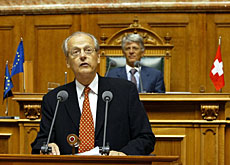Summit to unveil anti-terrorism convention

A new anti-terrorism convention is high on the agenda at this week's Council of Europe summit in Warsaw, attended by 46 countries including Switzerland.
Swiss President Samuel Schmid is one of dozens of heads of state and government at the meeting, which also aims to redefine the Council’s goals and priorities.
The two-day summit, only the third of its kind in the 55-year history of Europe’s oldest political organisation, is being held as part of ongoing efforts to hammer out a clear future mandate for the Council.
Officials said the emphasis would be on working out how to move forward with one of the Council’s main aims: the promotion of human rights, law and order and democracy – particularly in central and eastern Europe.
“At a time when enlargement of the European Union is redrawing [the map of] Europe, this summit should reassert the Council of Europe’s role as guardian of the values common to the whole continent,” the Council said in a statement released ahead of the first day of talks on Monday.
Claude Altermatt, the Swiss diplomat in charge of bilateral relations with the Council of Europe, told swissinfo that it was important to take a fresh look at the organisation’s work in the context of a recently expanded and increasingly powerful EU.
“The aim is to strengthen the role and position of the Council all over Europe,” he said.
Altermatt added that Schmid would be calling for more efforts to reform the European Court of Human Rights, the judicial body set up by the Council of Europe in 1959.
“The court is the cornerstone of the Council of Europe. But it is worrying to note that it has become the victim of its own success and can no longer cope with the increasing number of [cases it is expected to handle].”
Terrorism and trafficking
Three treaties will be opened for signature by member states during the summit.
The Convention on the Prevention of Terrorism aims to strengthen cooperation between member states on counter-terrorism measures. It also contains a provision governing the protection and compensation of victims of terrorist acts.
Altermatt welcomed the convention but warned that Switzerland would not be in a position to throw its weight behind it at this week’s summit.
“The text has only just been approved by the Council of Europe… and due to the very short deadline we will not be [ready] to sign it on May 16,” he said.
Two other conventions to be launched at the meeting seek to tackle human trafficking and money laundering.
The Council expects to set up what it describes as an “independent monitoring mechanism” with the aim of ensuring that all signatory states adhere to the spirit and letter of the treaties.
Human rights
Altermatt declined to comment on whether Swiss delegates at the summit would use the occasion to discuss the content of a Council of Europe report into Switzerland’s human-rights policy.
During a visit to Bern at the end of last year, the Council’s Human Rights Commissioner expressed “serious concerns” about prison overcrowding and the plight of rejected asylum seekers.
Alvaro Gil-Robles is due to publish his findings by mid-June.
A spokesman for the commissioner’s office told swissinfo that a draft of the report had been submitted to the Swiss authorities for comment.
Confirmation of the report’s publication date comes less than a week after the United Nations Committee against Torture raised its own concerns about human rights in Switzerland.
Committee members are worried about draft legislation in Switzerland defining the use of electroshock weapons during forced repatriations.
The committee – currently in session in Geneva – is assessing the extent to which the Swiss government is complying with the UN Convention against Torture.
swissinfo, Ramsey Zarifeh
The Strasbourg-based Council of Europe is made up of 46 member states and was set up in 1949 to defend human rights, parliamentary democracy and the rule of law.
Since 1989, it has focused on assisting the countries of central and eastern Europe with political and economic reform.
This week’s summit is the third of its kind after previous meetings in Vienna in 1993 and Strasbourg in 1997.

In compliance with the JTI standards
More: SWI swissinfo.ch certified by the Journalism Trust Initiative










You can find an overview of ongoing debates with our journalists here . Please join us!
If you want to start a conversation about a topic raised in this article or want to report factual errors, email us at english@swissinfo.ch.